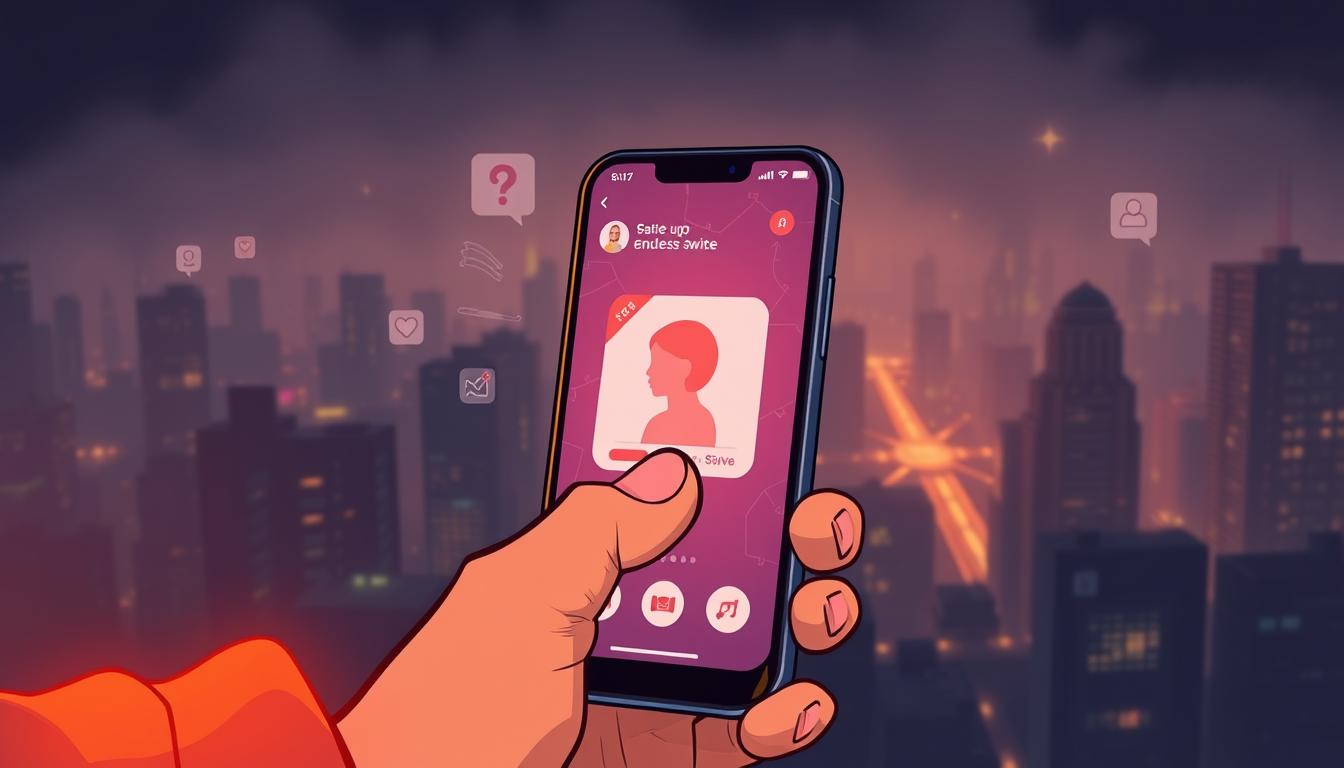More than half of Americans under 30 now use dating platforms to find partners, according to 2023 Pew Research data. These apps have reshaped how we approach romance, turning spontaneous connections into curated experiences. Helen Fisher, a leading biological anthropologist, warns this system taps into primal brain chemistry: “The mind is primed for addiction when chasing love.”
Swipe-based interfaces create instant judgments that feel productive but lack depth. Users often report cycling through profiles like playing slots – each match delivers a quick dopamine hit. This neurochemical response mirrors patterns seen in gambling and substance use disorders.
Modern platforms promise endless options yet leave many feeling disconnected. While convenient, the constant stream of potential matches can overwhelm decision-making processes. Relationships become transactional rather than organic.
Experts argue dating apps exploit our deepest biological drives for connection. The thrill of matching often overshadows actual conversation quality. As Fisher notes, these services trade on humanity’s “greatest prize” – the search for lasting love.
This digital shift raises critical questions about technology’s role in emotional health. While apps help people meet, their design may prioritize engagement over genuine bonding. Understanding this balance proves vital for users navigating today’s complex romantic landscape.
Exploring the Digital Dating Landscape
In 2020, dating app usage surged by 31% as lockdowns forced people to rethink how they connect. The Pew Research Center found LGBTQIA+ individuals led this shift, with 55% embracing online dating compared to 48% of all 18–29-year-olds. Mobile technology transformed romance from a planned activity into an always-accessible experience.
A Brief History of Swiping Culture
Early matchmaking websites required lengthy profiles and compatibility quizzes. This changed when location-based apps turned smartphones into pocket matchmakers. Swiping emerged as a solution to endless scrolling, reducing decisions to quick yes/no judgments.
The system created a paradox: more options led to choice paralysis. Users reported feeling overwhelmed by potential matches yet compelled to keep searching. By 2016, Tinder processed over 1 billion swipes daily worldwide.
How Mobile Technology Redefined Romantic Connection
Dating apps erased geographic limits, letting people match across cities or continents. Busy commuters could browse profiles during lunch breaks, while night owls chatted after midnight. Relationships began forming anywhere with cell service.
This convenience came at a cost. Constant access created decision fatigue, with many users struggling to commit. While apps democratized dating access, they also turned love into a high-volume search rather than a gradual discovery.
The Psychology Behind Swiping Behaviors
Modern dating platforms have rewired how people seek connections, prioritizing speed over substance in romantic pursuits. Stanford psychiatrist Elias Aboujaoude observes users chase a “chemical rush” from matches, comparing it to addictive behaviors. This system taps into primal reward circuits that evolved for survival, not digital interactions.
Instant Gratification and the Dopamine Rush
Dating apps deliver immediate validation through likes and matches, activating dopamine pathways linked to pleasure-seeking. Each swipe becomes a micro-decision with potential rewards, creating cycles of anticipation and brief satisfaction. Aboujaoude notes this mirrors slot machine mechanics, where unpredictable wins keep players engaged.
The Role of Visual Cues in Quick Judgments
First impressions now form in 0.3 seconds – faster than recognizing a familiar face. Users assess potential partners through photo-driven snap judgments, often overlooking profile details. This visual filtering prioritizes physical attraction over shared values or emotional compatibility.
Platforms amplify this effect through design choices. Bright notification badges and match sounds trigger instinctive responses. Over time, these cues train the brain to crave app interactions like other conditioned behaviors. The result? A dating culture where quick assessments replace meaningful conversations.
Examining the Psychological Effects of Swiping
Modern matchmaking platforms create unique challenges for personal confidence. A 2023 Journal of Social Psychology study found 62% of frequent app users tie their self-worth to match rates. This validation cycle creates rollercoaster emotions – euphoria with matches, emptiness when conversations stall.
When Digital Approval Defines Worth
Rejection in online dating operates differently than face-to-face interactions. Users face silent dismissals through unmatched profiles or unanswered messages. Research shows this ambiguity amplifies self-doubt, as people interpret digital silence as personal failure.
Creating profiles becomes a high-stakes performance. Many struggle to balance authenticity with attention-grabbing tactics. In crowded digital spaces, users often feel pressured to exaggerate traits or use misleading photos.
The endless stream of options creates decision fatigue. Studies reveal frequent app users take 28% longer to commit to dates than those meeting offline. This paradox leaves many feeling lonelier despite constant access to potential partners.
Mental health professionals note a troubling pattern: individuals with existing anxiety often use dating apps more actively but engage less. The platforms’ design rewards persistence, creating cycles where vulnerable users keep swiping despite negative experiences.
Dating Apps and Mental Health: Anxiety, Depression, and Loneliness
Recent clinical studies reveal a troubling link between dating app use and emotional well-being. Alisa Foreman, a licensed marriage and family therapist, observes: “Hours of swiping create isolation instead of connection. Digital rejection chips away at self-esteem, leaving users feeling invisible.”
Insights from Recent Studies and Surveys
Research shows heavy app users face 47% higher anxiety rates than offline daters. The constant search for validation triggers stress hormones, while algorithm-driven matches foster unrealistic expectations. Depression symptoms often follow prolonged use, especially when conversations vanish or dates disappoint.
Loneliness paradoxically grows despite endless options. A 2023 study found 68% of frequent swipers feel more disconnected than those meeting people organically. Superficial interactions fail to satisfy our need for meaningful bonds, creating emotional voids.
User Experiences: From Ghosting to Emotional Burnout
Ghosting leaves lasting scars, with 54% of users reporting trust issues in real relationships. Many describe dating fatigue – the exhaustion of repeating conversations that lead nowhere. “It’s like applying for jobs that never reply,” shares one user who deleted apps after six months of dead-end chats.
Mental health professionals now see app-related burnout as a growing crisis. Endless swiping cycles drain emotional reserves, making some users cynical about love itself. As screens replace face-to-face flirting, many struggle to rebuild confidence in authentic connection.
Algorithms, Addictive Features, and Game-Like Design in Dating Apps
Behind every swipe lies a carefully engineered system designed to keep users engaged. Dating apps employ casino-inspired mechanics that transform romance into a numbers game. Cheng “Chris” Chen from Elon University explains: “Swiping triggers playful instincts – it’s more entertaining than traditional online dating methods.”
Push Notifications and the Allure of Random Rewards
Apps use unpredictable alerts to create anticipation. A late-night ping about new matches activates the same brain regions as gambling wins. These notifications interrupt daily life, maintaining constant awareness of potential connections.
Match Group’s Hinge CEO Justin McLeod describes their approach: “We build taste profiles, not attractiveness scores.” The Gale-Shapley algorithm analyzes user preferences through likes and dislikes. Yet this system remains opaque, leaving many wondering how matches truly form.
The Mystery of Compatibility Algorithms
Most apps guard their matching formulas closely. While companies claim scientific methods, engagement metrics often influence suggestions. Users receive endless options but struggle to find meaningful connections.
Gamification features like achievement badges keep people swiping. Data collection allows platforms to exploit personal preferences, creating filter bubbles. What begins as efficient matchmaking often becomes an endless scroll for validation.
Navigating Relationship Expectations in a Digital World
Digital interactions have reshaped how people approach romance, creating gaps between virtual ideals and real-world dynamics. Alisa Foreman, a licensed therapist, observes: “Apps condition users to expect instant results, but healthy relationships need time to grow.” This disconnect often leads to frustration when digital sparks fade during face-to-face meetings.
When Screens Replace Human Nuance
Online dating accelerates initial connections but struggles with depth. Many users report “profile whiplash” – the jarring transition from curated text conversations to authentic in-person communication. Emoji-filled chats rarely prepare people for reading body language or managing awkward silences.
Platforms prioritize first impressions through photos and quick bios. This creates mismatched expectations when personalities emerge offline. A coffee date might reveal dealbreakers invisible through filtered selfies or clever captions.
The abundance of options fuels commitment fears. 63% of app users admit keeping “backup matches” during early dating phases. This safety net mentality undermines relationship-building efforts, as partners sense divided attention.
Traditional courtship milestones now compete with digital habits. Three-day texting rules replace spontaneous phone calls, while ghosting substitutes closure. As Foreman notes: “We’re forgetting how to work through challenges when endless alternatives sit in our pockets.”
Strategies for Healthier Online Dating and Swiping Habits
Breaking free from dating app fatigue requires intentional strategies that prioritize real connections over endless scrolling. Experts suggest treating app use like nutrition – moderation and quality matter more than quantity.
Setting Time Limits and Embracing Digital Detox
Treat dating apps like a tool, not a pastime. Set daily swiping limits using phone timers. Schedule 20-minute sessions twice daily instead of constant checking. Disable notifications to regain control over your attention.
Full detox periods help reset habits. Delete apps during busy work weeks or emotional slumps. Many users report clearer priorities after week-long breaks. “It’s like quitting junk food for your heart,” says relationship coach Marisa T. Cohen.
Building Self-Esteem and Fostering Authentic Connections
Focus on profile quality over quantity. Share hobbies that spark joy, not just attractive photos. Practice writing bios that reflect true interests – this filters mismatched matches early.
Move conversations offline within three days. Coffee meetups reveal chemistry faster than weeks of texting. Studies show in-person meetings within a week increase relationship satisfaction by 34%.
Balance app use with real-world socializing. Join clubs or attend events where connections form naturally. Remember: Dating apps are one path among many to find meaningful relationships.





